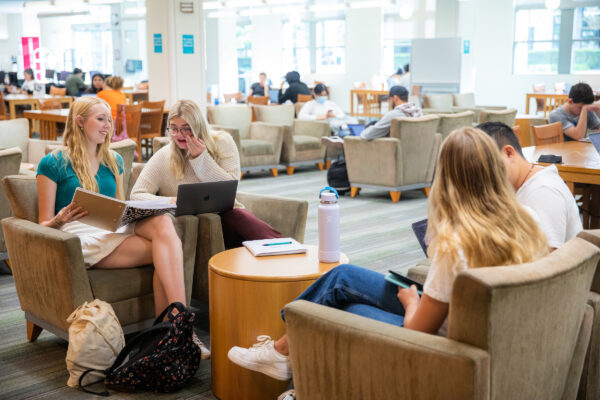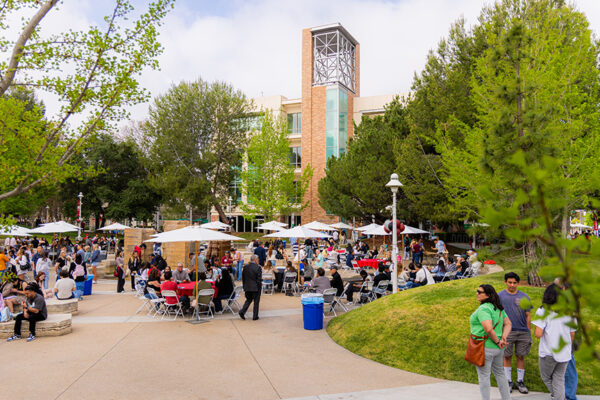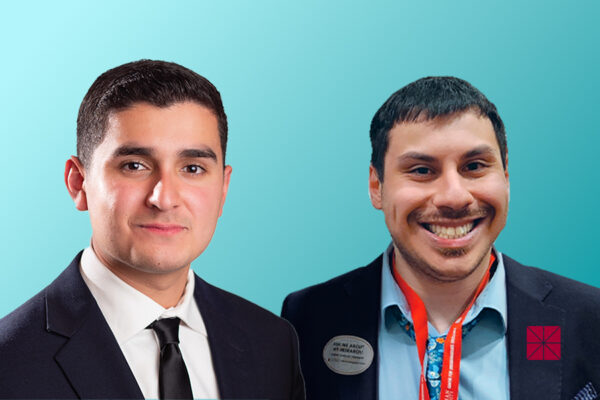The mad scientist’s face had melted off and he was terrorizing everyone else around the laboratory. But that wasn’t the problem. That bit of digitized wickedness was exactly what the two student video game inventors envisioned for their antagonist in the virtual world unfolding on their computers. No, the trouble was the mad scientist’s skeleton. He didn’t have one and it was making him a little flighty.
“Modeling the characters is hard. I’m trying to put skeletons in so they don’t fly all over the place,” says Brian Rechenmacher, a sophomore digital arts major enrolled in the interterm course “Introduction to the Game Industry.” Rechenmacher and his classmate, freshman history major Anthony Young, are toiling away in a computer lab all this month to create their own video game in a class taught by Adam Rote, assistant professor, Dodge College of Film and Media Arts.
Luckily, they’ll have plenty of time to focus on the project and master sophisticated video game software and improve on the spineless scientist they’ve imagined. That’s because interterm is an intensive four-week session between the traditional fall and spring semesters when the university offers an array of courses uniquely suited to an intense blast of study, and at no additional cost if students are enrolled full time in the fall and spring terms.
The winter interterm tradition is much beloved and dates to 1971. Courses can be quirky, but they are also demanding. Students take one course and typically have class four to five days a week and in some pretty hefty time chunks – entire mornings or afternoons. It’s a unique opportunity for students and faculty, says Raymond Sfeir, Ph.D., vice chancellor for academic administration.
“The main purpose of interterm is to allow the faculty to offer some innovative classes, something they want to try, something new that they have not done before,” Dr. Sfeir says. In recent years some general education classes have been added to the schedule to meet student and family needs for early graduation or a time to catch up on units, Dr. Sfeir says, but that is not its emphasis.
It’s always been an ideal time for travel courses, too. Donald Booth, Ph.D., professor, Argyros School of Business and Economics, recalls leading a trip in 1971 to the former Soviet Union in the dead of winter. Now there are more than a dozen travel trips underway, ranging from a documentary team filming on location at Mount Kilimanjaro to a finance class visiting Wall Street for tours and interviews.
But the majority of the 2,700 students enrolled in the optional session are on campus, working on projects that might be unwieldy or lose intensity in a traditional semester. It’s just the thing for an art class, says adjunct professor Brian Cooper, who’s teaching “Experimental Drawing.” His students unpack their supplies at 9 a.m. and settle in for a marathon of work that lasts until 2:30 p.m.
“It’s a lot of studio time, really super concentrated. You get really into it. For this type of class you’ve got to be a little bit of a risk taker, break the inhibitions, let yourself go,” Cooper says.
Meanwhile, students in Introduction to American Politics, taught by Lori Cox Han, Ph.D., professor, Department of Political Science, are preparing for their final project – a hands-on-work-the-room policy-making simulation during which they play all the major politicos of the moment and attempt to pass an education reform bill over the course of two long evenings. Students in French 346, taught by John Boitano, Ph.D., associate professor, Department of Languages, are trying to solve a murder mystery in French, minding their verbs and subjunctive tenses as they fill out police reports, interview suspects and try to figure out how the victim’s lipstick ended up on the coffee cup of a certain man in town.
And in his Environmental Life Writing interterm course professor Brian Glaser immerses students in that genre of writing about a personal experience with the environment – from Thoreau’s Walden to Doug Fine’s Farewell, My Subaru – and also challenges them to spend a week doing something similar and writing about it.
“It’s beneficial to have concentrated attention on this. They can see the similarities in the readings. Students can do both the experiential learning and critical reflection” without the juggling of other coursework, says Glaser, Ph.D., assistant professor, Department of English.
Indeed, some of the tasks Glaser’s students set for themselves, like living a week without a car, convenience foods or electric lighting, are taxing. Junior creative writing major Matthew Fons, for one, was trying to get through just one week on food that had only one layer of packaging and was lamenting the loss of boxed teabags and joked that he foresaw a week-long diet of bananas and cranberries.
That’s the interterm experience for you. Intense, creative, immersive and, on occasion, slightly bananas.




Add comment